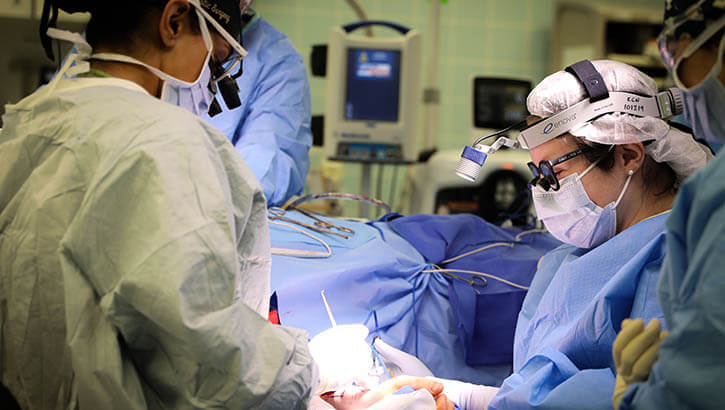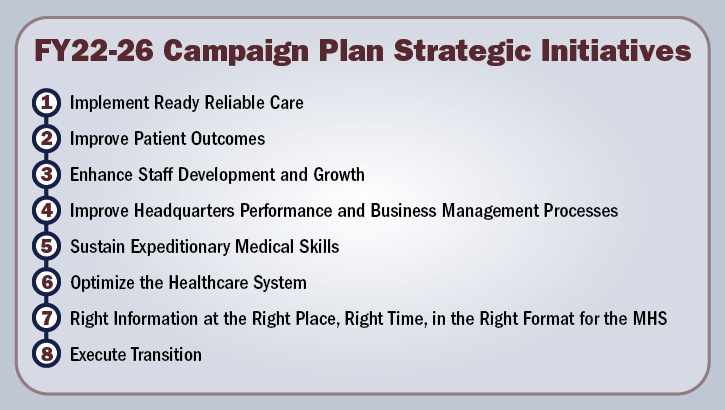Campaign Plan Targets Medical Readiness, Better Health
 (From left) Army Lt. Col. Shimul Patel, chief, Plastic Surgery Services, Landstuhl Regional Medical Center, and U.S. Army Lt. Col. Jessica Peck, chief, Ear, Nose and Throat Clinic, LRMC, operate on a cancer patient during the first microvascular reconstruction and anastomosis procedure ever performed at LRMC, Dec. 3, 2021. (Photo by Marcy Sanchez)
(From left) Army Lt. Col. Shimul Patel, chief, Plastic Surgery Services, Landstuhl Regional Medical Center, and U.S. Army Lt. Col. Jessica Peck, chief, Ear, Nose and Throat Clinic, LRMC, operate on a cancer patient during the first microvascular reconstruction and anastomosis procedure ever performed at LRMC, Dec. 3, 2021. (Photo by Marcy Sanchez)
The Defense Health Agency recently launched a five-year campaign plan identifying the eight strategic initiatives focused on improving the medical readiness of U.S. military personnel and the health of its 9.6 million beneficiaries.
This agency-wide strategy builds upon the fiscal year 2021 campaign plan and supports DHA’s priorities – Great Outcomes, Ready Medical Force, Satisfied Patients and Fulfilled Staff.
Army Colonel Jenifer Meno, DHA’s director for strategy, planning, and functional integration, said developing the five-year campaign plan has been a collaborative effort across the DHA.
“We continue to develop as a learning organization during DHA’s transformation,” Meno said. “The process continues to get better by synchronizing efforts, developing projects, establishing performance measures and a library to provide access to the performance data.”
Air Force Brig. Gen. Anita Fligge, DHA’s director of Operations, Strategy and Education, said the campaign plan provides a vision for the organization to improve the system of care and force readiness.
“As we transition from 20 years of deployments, we must sustain our critical wartime skills through strategic partnerships within the federal government in addition to civilian universities and hospitals,” said Fligge, who is also DHA’s Chief Nursing Officer.
“The work being done is crucial and is not limited to providers, but encompasses nurses, medics, and corpsmen.”
 DHA Campaign Plan Strategic Initiatives for FY 22-26
DHA Campaign Plan Strategic Initiatives for FY 22-26
The Defense Health Agency’s global workforce of almost 140,000 civilians and military personnel is committed to medical excellence, health care improvement and ensuring military personnel are ready to perform combat operations and humanitarian missions at home and abroad.
Fligge stressed the importance of each of the eight initiatives to DHA's mission and the success of the campaign plan. However, when it comes to providing outstanding medical care to service members now and in the future, Ready Reliable Care stands at the forefront.
"Our patients are the heart and soul of our mission," Fligge said. "We come to work every day to ensure our nation's military members and their families are healthy, safe, and ready to take on the next challenge. That's what being a ready, reliable system means."
"I am a firm believer in the tenets of a high reliability organization, so I am 100 percent behind Ready Reliable Care as a strategic initiative," Fligge added.
Dr. Paul Cordts, DHA’s chief medical officer and deputy assistant director for medical affairs, said the campaign plan ensures that our medical teams have the right skills, equipment and direction to provide beneficiaries with the best care possible while ensuring force readiness.
"Our first campaign plan in 2021 was the beginning of both an operational and cultural shift in the way we perform our mission," Cordts explained. "We are leading the nation with value-based initiatives using patient reported outcomes to drive improvement to support our service members and beneficiaries. We are excited to pilot and incrementally spread the success in our five-year plan to optimize access and treatment plans for service members with musculoskeletal, behavioral health and other duty limiting conditions."
For more information about the Campaign Plan and its impact on medical care, improving health and maintaining force readiness, visit health.mil/strategy.